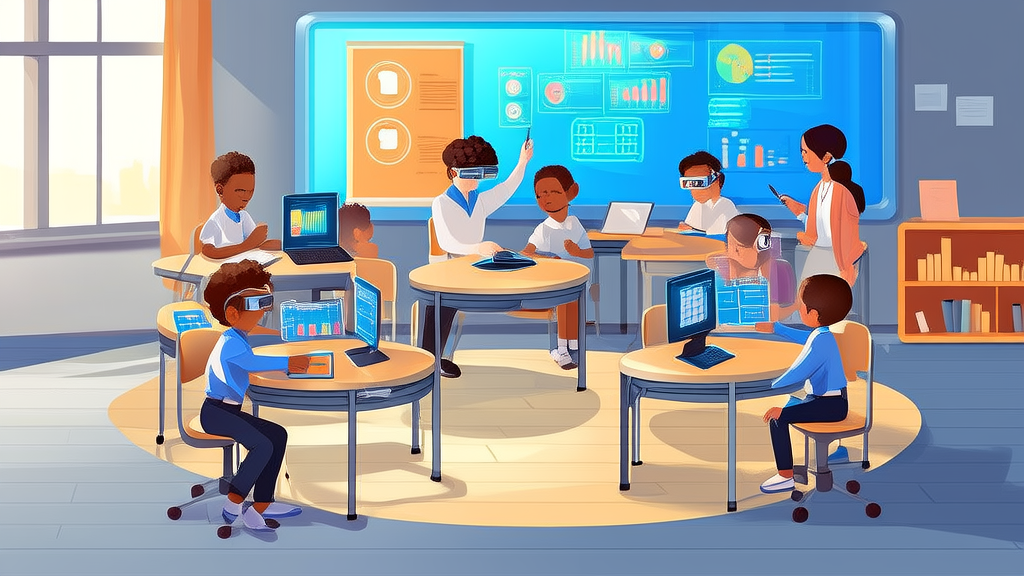3 Key Trends Revolutionizing K12 Education in 2025: Personalization, SEL, and EdTech

Empowering the Next Generation: Navigating K12 Education in 2025
Welcome to the future of education, where innovation and technology are transforming the way our children learn. As we step into July 2025, it's an exciting time for both parents and educators, with new methodologies, insights, and technologies shaping the educational landscape. This blog post aims to provide a comprehensive overview of the latest trends, research, and practical tips that can help us better support the development and success of K12 students.
The Power of Personalized Learning: Tailoring Education to Each Student
One of the most significant shifts in K12 education is the move towards personalized learning. This approach recognizes that each student has unique strengths, weaknesses, and learning styles. By tailoring the curriculum and teaching methods to individual needs, personalized learning can significantly enhance engagement and academic performance.
Example: The Summit Learning Platform, used by over 330 schools across the United States, offers a personalized learning experience. Students set goals, track their progress, and receive targeted support from teachers. Schools using this platform have reported higher student engagement and improved academic outcomes.
Actionable Advice: For educators, implementing a flexible curriculum that allows for customization based on student needs is key. Parents can support this by staying informed about their child's learning style and collaborating with teachers to create a supportive learning environment at home.
Child Development Insights: Understanding How Kids Learn Best
Recent research in child development has provided valuable insights into how children learn and grow. Studies show that a holistic approach, which includes social, emotional, and cognitive development, is crucial for long-term success.
Research Highlight: A study published in the Journal of Educational Psychology found that students who received social-emotional learning (SEL) instruction showed significant improvements in academic performance, behavior, and mental health. SEL programs teach skills like self-awareness, self-management, and responsible decision-making.
Actionable Advice: Teachers can integrate SEL into their daily lessons by incorporating activities that promote empathy, teamwork, and problem-solving. Parents can reinforce these skills at home by encouraging open communication, setting consistent routines, and modeling positive behaviors.
Educational Technology Trends: Enhancing the Learning Experience
Technology continues to play a pivotal role in K12 education, offering new tools and platforms that make learning more interactive and accessible. From virtual reality (VR) and augmented reality (AR) to artificial intelligence (AI), these technologies are revolutionizing the classroom.
Example: Google's Expeditions AR app allows students to explore historical sites, scientific concepts, and more in an immersive, 3D environment. This not only makes learning more engaging but also helps students retain information better.
Actionable Advice: Educators should stay updated on the latest edtech tools and integrate them thoughtfully into their lesson plans. Parents can support this by providing access to digital resources at home and ensuring that their children use technology responsibly and effectively.
Success Stories and Case Studies: Real-World Examples of Effective Practices
There are numerous success stories and case studies that highlight the impact of innovative teaching practices and technologies. These examples can serve as inspiration and guidance for both parents and educators.
Case Study: The Khan Academy, a non-profit educational organization, offers free online courses and resources for students of all ages. A study conducted by SRI International found that students who used Khan Academy for math instruction showed significant gains in test scores and overall understanding of mathematical concepts.
Actionable Advice: Educators can leverage platforms like Khan Academy to supplement their teaching and provide additional practice for students. Parents can encourage their children to use these resources for extra support and to explore new topics of interest.
Conclusion: Embracing the Future of K12 Education
As we navigate the ever-evolving landscape of K12 education, it's clear that a combination of personalized learning, child development insights, and educational technology can create a powerful and effective learning environment. By staying informed, collaborating, and embracing new tools and methodologies, we can ensure that our children are well-prepared for the challenges and opportunities of the future.
Let's work together to empower the next generation and build a brighter, more inclusive educational future. If you have any questions or would like to share your own experiences, please leave a comment below. We'd love to hear from you!